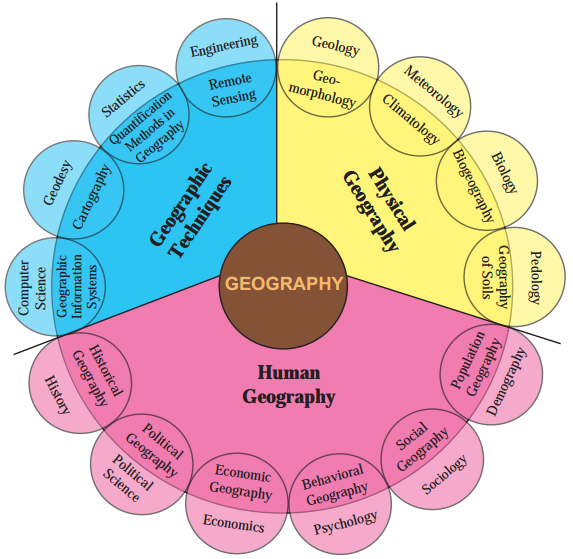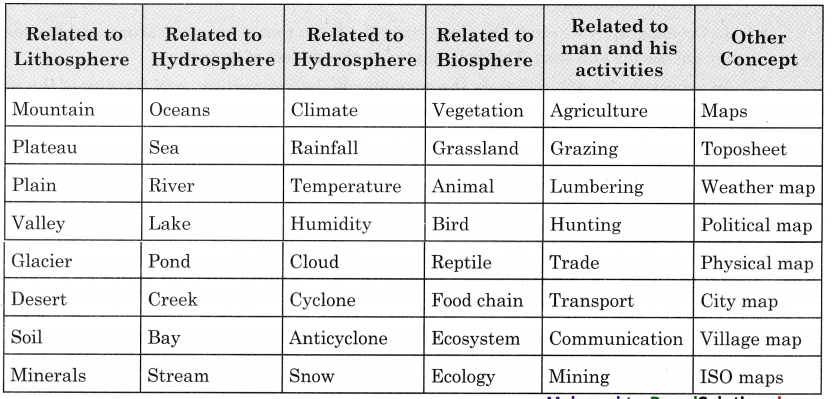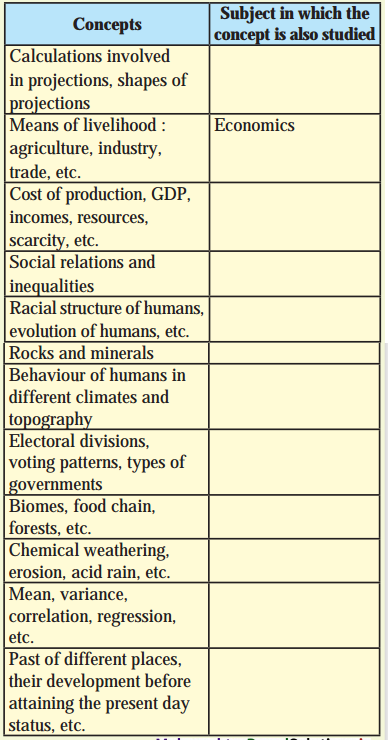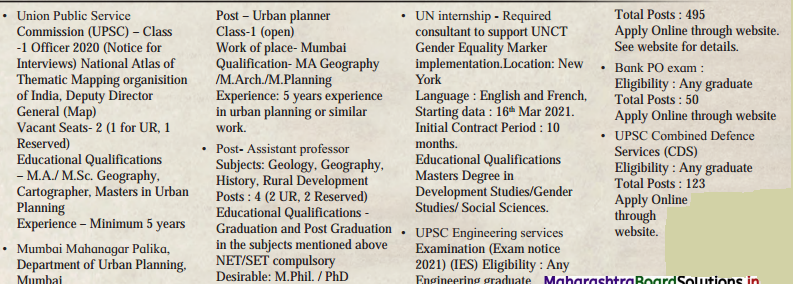Balbharti Maharashtra State Board Class 12 Geography Solutions
Chapter 8 Geography: Nature and Scope Textbook Exercise Questions and Answers.
1. Identify the correct group.
Question 1.
Answer:
B

Question 2.
Answer:
A
2. Give geographical reasons.
Question 1.
Human Geography is multidisciplinary in nature.
Answer:
Question 2.
Geography is dynamic in nature.
Answer:
Question 3.
Geography is dualistic in nature.
Answer:

3. Write short notes on.
Question 1.
Physical Geography is related to various branches of science.
Answer:
Question 2.
Branches of Geography.
Answer:
Question 3.
Latest trends in Geography.
Answer:
Question 4.
Skills required for studying geography.
Answer:

4. Answer the following questions in detail.
Question 1.
Explain how the knowledge of Geography is important in our day-to-day life. Give examples.
Answer:
Question 2.
Discuss the relationship between Geography and other subjects.
Answer:

Question 3.
Explain the nature of Geography in detail.
Answer:
5. Differentiate between.
Question 1.
Physical Geography and Human Geography
Answer:
Question 2.
Possibilism and Determinism.
Answer:

6. Draw a neat and well-labelled diagrams
Question 1.
Relationship between Geography and other subjects.
Answer:

Question 2.
Skills required to study Geography.
Answer:

Class 12 Geography Chapter 8 Geography: Nature and Scope Intext Questions and Answers
Let’s recall
Question 1.
Dear students, you have been studying geography either as a part of Environmental Studies since Standard III or as Social Studies since Standard VI and as an independent subject since Standard XI. Your journey to understand our homeland earth began with the study of the cardinal directions in Standard III. In the consecutive academic years, you learnt various geographical concepts. Now just recall the various concepts that you have learnt till now and make a list of them. Also classify them under different categories given in the table 8.3. (Textbook Page No. 75)
Answer:


Can you tell?
Discuss the following points in class with reference to its importance in the subject matter of Geography. (Textbook Page No. 77)
Question 1.
Environment vs. Man
Answer:
Man and environment are inter-related. The environment influences the life of human beings who in-turn modifies the environment as a result of their growth, dispersal, activities, death, etc. Thus, all living beings including man and their environment are mutually reactive affecting each other in a number of ways and a dynamic equilibrium is possible between the two, i.e., human beings and environment are interdependent. If the natural environment helped in the development of different structures of the society on the one hand, the existence and quality of environment now rests on the responses of these social structures to the environment on the other hand.
The burning issues like quality of environment, disruption of earth’s natural ecosystems, environmental degradation and pollution, ecological imbalances, depletion of resources, etc., can be approached and solved only after considering the value judgments which may be determined by taking into account the consequences of ‘Environmental Improvement Programme’ on the entire society and society’s response towards the programme. However, all these depend on the interest and desire of the society in improving the quality of environment.
The interaction between the environment and man depends largely on the social and political system. The differential interactions are due to the uneven distribution of natural resources, uneven economic and social development, dissimilarities of demographic factors, varying view points of the governments and individuals towards the environment, etc.
Continuous and exceedingly increasing rate of exploitation of natural resources, industrialisation, technological growth, unplanned urbanisation and profit-oriented capitalism by the developed western world are responsible for grave environmental crisis and ecological imbalance not confined to their own countries but to the whole world.
The changes in the relationship between man and environment depend upon the change in organisation and attitude of man. To improve environmental stand and to maintain ecological balance, the following remedies are important

Question 2.
Complete study of India vs. Study of only agriculture in India.
Answer:
[Note: In India, it is not possible to provide a complete study of India and agriculture within the scope of a book.]
Try These
Question 1.
Given here are some of the concepts or subject matter we study in Geography. Write the name of subjects or disciplines you think they are also studied in. Complete the table 8.2. (Textbook Page No. 78)

Answer:

Question 2.
In Fig 8.5, a newspaper item is given. A list of job opportunities is given. Go through all the entries and see which ones are suitable for a geographer as a career. (Textbook Page No. 80)

Answer:
The following is the list of jobs opportunities suitable for a geographer as a career.
(i) National Atlas of Thematic Mapping Organisation of India.
(ii) Mumbai Mahanagar Palika, Department of Urban Planning, Mumbai, as Urban Planner
(iii) Assistant Professor in the subject of Geography
For all above posts basic qualification is minimum M.A./M.Sc. in Geography.
Chapter 8 Geography: Nature and Scope Textbook Exercise Questions and Answers.
1. Identify the correct group.
Question 1.
| A | B | C | D |
| Geomorphology | Cartography | Tourism | Political Geography |
| Climatology | Survey Forest | Conservation | Physical Geography |
| Biogeography | Data collection | Wildlife Conservation | Population Geography |
| Historical Geography | GIS/GPS | Culture Conservation | Economic Geography |
B

Question 2.
| A | B | C | D |
| History | Economics | Biogeography | Geomorphology |
| Sociology | Geology | Population Geography | GIS |
| Demography | Remote sensing | Cartography | Demography |
| Political Science | Climatology | Psychology | Pedology |
A
2. Give geographical reasons.
Question 1.
Human Geography is multidisciplinary in nature.
Answer:
Question 2.
Geography is dynamic in nature.
Answer:
Question 3.
Geography is dualistic in nature.
Answer:

3. Write short notes on.
Question 1.
Physical Geography is related to various branches of science.
Answer:
Question 2.
Branches of Geography.
Answer:
Question 3.
Latest trends in Geography.
Answer:
Question 4.
Skills required for studying geography.
Answer:

4. Answer the following questions in detail.
Question 1.
Explain how the knowledge of Geography is important in our day-to-day life. Give examples.
Answer:
Question 2.
Discuss the relationship between Geography and other subjects.
Answer:

Question 3.
Explain the nature of Geography in detail.
Answer:
5. Differentiate between.
Question 1.
Physical Geography and Human Geography
Answer:
| Physical Geography | Human Geography |
| (i) Physical Geography is the branch of geography dealing with natural features. | (i) Human Geography is the branch of geography dealing with how human activities influence the culture, communities, economies, etc. |
| (ii) Geomorphology, Climatology, Oceanography, Biogeography, Geography of soils, are the branches of Physical Geography. | (ii) Historical Geography, Political Geography, Economic Geography, Behavioural Geography, Social Geography and Population Geography are the branches of Human Geography. |
| (iii) Physical geography is natural science. | (iii) Human geography is a social science. |
Possibilism and Determinism.
Answer:
| Possibilism | Determinism |
| (i) When man dominates nature, it is called possibilism. | (i) When nature dominates man, it is called determinism. |
| (ii) Due to intelligence, man makes changes in the natural environment. | (ii) Determinism asserts that development of human history, culture, society, lifestyle, etc., are shaped by their physical environment. |
| (iii) There are limitations to changes made by man in nature. | (iii) There are no limitations on impact of physical environment on human activities. |

6. Draw a neat and well-labelled diagrams
Question 1.
Relationship between Geography and other subjects.
Answer:

Question 2.
Skills required to study Geography.
Answer:

Class 12 Geography Chapter 8 Geography: Nature and Scope Intext Questions and Answers
Let’s recall
Question 1.
Dear students, you have been studying geography either as a part of Environmental Studies since Standard III or as Social Studies since Standard VI and as an independent subject since Standard XI. Your journey to understand our homeland earth began with the study of the cardinal directions in Standard III. In the consecutive academic years, you learnt various geographical concepts. Now just recall the various concepts that you have learnt till now and make a list of them. Also classify them under different categories given in the table 8.3. (Textbook Page No. 75)
Answer:


Can you tell?
Discuss the following points in class with reference to its importance in the subject matter of Geography. (Textbook Page No. 77)
Question 1.
Environment vs. Man
Answer:
Man and environment are inter-related. The environment influences the life of human beings who in-turn modifies the environment as a result of their growth, dispersal, activities, death, etc. Thus, all living beings including man and their environment are mutually reactive affecting each other in a number of ways and a dynamic equilibrium is possible between the two, i.e., human beings and environment are interdependent. If the natural environment helped in the development of different structures of the society on the one hand, the existence and quality of environment now rests on the responses of these social structures to the environment on the other hand.
The burning issues like quality of environment, disruption of earth’s natural ecosystems, environmental degradation and pollution, ecological imbalances, depletion of resources, etc., can be approached and solved only after considering the value judgments which may be determined by taking into account the consequences of ‘Environmental Improvement Programme’ on the entire society and society’s response towards the programme. However, all these depend on the interest and desire of the society in improving the quality of environment.
The interaction between the environment and man depends largely on the social and political system. The differential interactions are due to the uneven distribution of natural resources, uneven economic and social development, dissimilarities of demographic factors, varying view points of the governments and individuals towards the environment, etc.
Continuous and exceedingly increasing rate of exploitation of natural resources, industrialisation, technological growth, unplanned urbanisation and profit-oriented capitalism by the developed western world are responsible for grave environmental crisis and ecological imbalance not confined to their own countries but to the whole world.
The changes in the relationship between man and environment depend upon the change in organisation and attitude of man. To improve environmental stand and to maintain ecological balance, the following remedies are important

Question 2.
Complete study of India vs. Study of only agriculture in India.
Answer:
[Note: In India, it is not possible to provide a complete study of India and agriculture within the scope of a book.]
Try These
Question 1.
Given here are some of the concepts or subject matter we study in Geography. Write the name of subjects or disciplines you think they are also studied in. Complete the table 8.2. (Textbook Page No. 78)

Answer:
| Concepts | Subject in which the concept is also studied |
| Calculations involved in projections, shapes of projections | Cartography |
| Means of livelihood: agriculture, industry, trade, etc. | Economics – Economic Geography |
| Cost of production, GDP, incomes, resources, scarcity, etc. | Economics – Economic Geography |
| Social relations and inequalities. | Sociology – Social Geography |
| Racial structure of humans, evolution of humans, etc. | Anthropology -Human Geography |
| Rocks and minerals | Geology – Geomorphology |
| Behaviour of humans in different climates and topography. | Psychology – Behavioural Geography |
| Electoral divisions, voting patterns, types of governments | Politics – Political Geography |
| Biomes, food chain, forests, etc. | Biology – Biography |
| Chemical weathering, erosion, acid rain, etc. | Geography – Physical Geography |
| Mean, variance, correlation, regression, etc. | Statistics – Statistical Geography |
| Past of different places, their development before attaining the present-day status, etc. | History – Historical Geography |

Question 2.
In Fig 8.5, a newspaper item is given. A list of job opportunities is given. Go through all the entries and see which ones are suitable for a geographer as a career. (Textbook Page No. 80)

Answer:
The following is the list of jobs opportunities suitable for a geographer as a career.
(i) National Atlas of Thematic Mapping Organisation of India.
(ii) Mumbai Mahanagar Palika, Department of Urban Planning, Mumbai, as Urban Planner
(iii) Assistant Professor in the subject of Geography
For all above posts basic qualification is minimum M.A./M.Sc. in Geography.